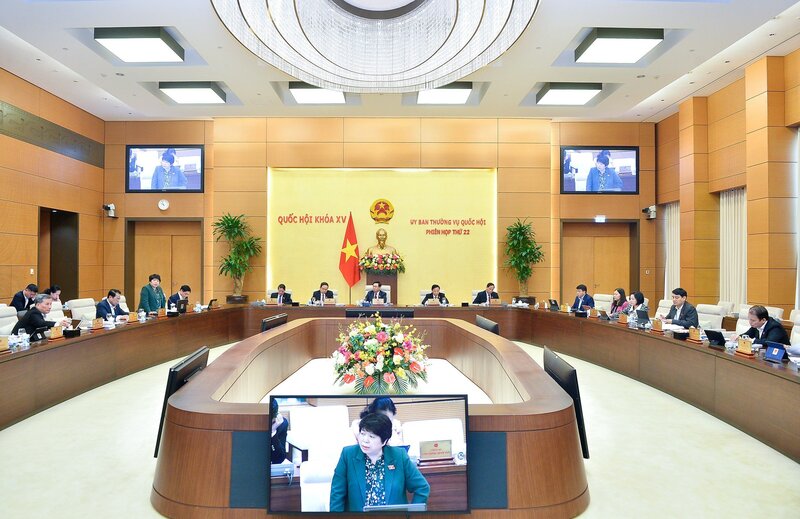Vietnam's parliament to scrutinize real estate, social housing markets
The difficulties in the real estate sector may have contributed to Vietnam's lower-than-expected GDP growth in the first quarter (3.32%).
The National Assembly Standing Committee will scrutinize the management of the real estate market and the development of social housing, among other areas, in the coming year.
| Overview of the meeting. Source: Quochoi |
Secretary General of the National Assembly Bui Van Cuong made the remarks at the National Assembly Standing Committee meeting on April 11 to discuss the supervision plan for 2024.
Cuong stressed the urgent need to strengthen supervision of the real estate and social housing sectors, which have become pressing issues in practice.
He pointed out that the Real Estate Business Law and the drafted Amended Housing Law, which are expected to be approved at the upcoming 6th Session on October 2023, will serve as important sources of information for the National Assembly and the National Assembly Standing Committee to carry out general supervision.
Vuong Dinh Hue, Chairman of the National Assembly, emphasized the importance of the National Assembly in supervising the activities in the real estate market, saying, "It is a crucial and relevant issue in the current period".
| Chairman of the National Assembly Vuong Dinh Hue at the meeting. |
As some of the contents of four laws related to the real estate market, including laws on Investment, Construction, Real Estate Business, and Housing, overlap and will be revised in the coming years, Hue expected the National Assembly to play a proactive role in addressing shortcomings in the market.
"This is especially important as the real estate market is inter-connected with many other markets, such as credit, corporate bonds, finance and capital supply for the economy, and social housing development," Hue said.
He also mentioned the recent decline in the economy's growth rate in the first quarter, which can be partly attributed to the challenges faced by the property market.
"There should be joint efforts from the government and National Assembly agencies to fully address the issues in the market," Hue added.
The real estate industry contributes about 11% to the GDP and is linked to several other industries and sectors. However, it faces challenges due to legal issues and cash flow problems. To address these challenges, the government established a working group at the end of last year and issued Resolution 33 in mid-March, outlining solutions to promote the safe and healthy development of the real estate market while addressing existing problems.
In early April, Prime Minister Pham Minh Chinh approved a social housing development project to provide at least one million affordable homes for low-income people by 2030. The total capital required for the project is estimated at VND849 trillion (US$36.2 billion), mainly from private sources.
In addition, according to the latest guidelines issued by the State Bank, investors can obtain a loan at a preferential interest rate of 8.7% per annum for three years from the date of disbursement, while homebuyers are entitled to an interest rate of 8.2% per annum for five years. The program has a budget of VND120 trillion ($5.11 billion) and will be implemented until December 31, 2030, or until the budget is fully disbursed, whichever comes first.
Other potential areas to be included in the National Assembly's monitoring program include the implementation of Resolution 43 on fiscal and monetary policies to support the recovery programs, socio-economic development, and resolutions on various critical national projects.
The National Assembly will also review the performance of public non-business units during the 2017-2023 period and the government's efforts to ensure traffic order and safety.
In addition, public and public-private partnership (PPP) investments are also expected to be included in the monitoring program.














